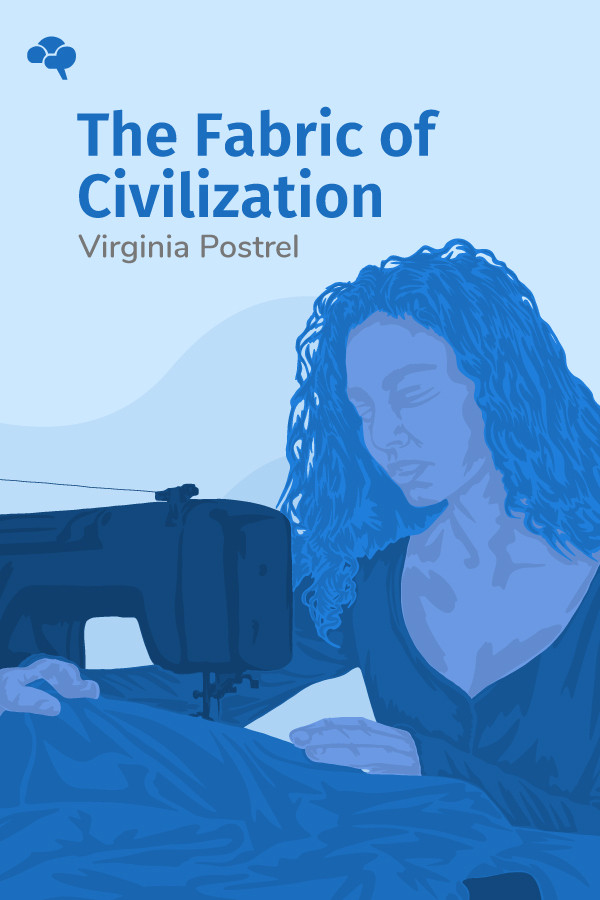Virginia Postrel
Virginia Postrel (pron. PAH-STRELL) is an author, columnist, and speaker whose work spans a broad range of topics, from social science to fashion, concentrating on the intersection of culture, commerce, and technology.
Writing in Vanity Fair, Sam Tanenhaus described her as "a master D.J. who sequences the latest riffs from the hard sciences, the social sciences, business, and technology, to name only a few sources."
Her next book The Fabric of Civilization: How Textiles Made the World examines the development of technology, industry, and commerce through the history of textiles, from prehistoric times to the near future. Research for the book is supported by a grant from the Alfred P. Sloan Foundation's Program for the Public Understanding of Science, Technology, and Economics. She has been a guest scholar at the Centre for Textile Research at the University of Copenhagen.
Postrel's previous books include The Power of Glamour: Longing and the Art of Visual Persuasion
A popular speaker for business, design, and university groups, she has taught seminars on "Glamour: Theory and Practice" in the Branding MPS program at the School of Visual Arts in New York.
She has been a columnist for The Wall Street Journal, The Atlantic, The New York Times, and Forbes and its companion technology magazine Forbes ASAP.
Postrel received the 2011 Bastiat Prize, honoring journalism that displays "support for the institutions of the free society, persuasiveness, wit and creativity, relevance, and clarity and simplicity." Her work was featured in The Best American Science and Nature Writing 2009 and The Best American Science and Nature Writing 2004. In 2012, her Bloomberg columns received a first-place award for online entertainment commentary from the Los Angeles Press Club. The judges wrote that "Postrel shows a sharp eye for detail and gleans meaningful truths from our entertainment culture."
From July 1989 to January 2000, Postrel was the editor of Reason magazine. Under her leadership, Reason was a finalist for the National Magazine Awards, the industry's highest honor, for essays in 1993 and public interest journalism in 1996 and in 1998, when Reason had two finalist articles. She founded Reason.com in 1995, establishing Reason as an online pioneer.
In March 2006, she donated a kidney to her friend Sally Satel, a psychiatrist and research fellow at the American Enterprise Institute. She has become a vocal advocate of living organ donations and supports reforming federal laws that prohibit payment of any "valuable consideration" to organ donors. She writes and speaks frequently on the subject. Her most comprehensive article on the subject is this Atlantic.com feature.
She serves on the boards of the Foundation for Individual Rights in Education and the Southern California Handweavers' Guild, for which she serves as programming co-chair and manages social media.
Postrel has twice been a finalist in the commentary category of the Gerald Loeb Awards for Distinguished Business and Financial Journalism for her columns in Reason. In 2002, she received the Press Club of Dallas's Katie Award for commentary for a column in D Magazine.
Prior to becoming editor of the magazine in 1989, Postrel served as associate editor of Reason and, before that, as a reporter for Inc. and The Wall Street Journal.
Postrel graduated Phi Beta Kappa from Princeton University, with a degree in English literature, specializing in the Renaissance, and a heavy concentration of economics coursework. She is married to Steven Postrel, an economist and business strategy professor, and lives in Los Angeles.
The Fabric of Civilization: How Textiles Made the World
The late computer scientist Mark Weiser aptly observed that, “the most profound technologies are those that disappear. They weave themselves into the fabric of everyday life until they are indistinguishable from it.” As evidenced even in his choice of metaphor, fabric is one such technology, an overlooked common thread that knits human history together. In The Fabric of Civilization, journalist Virginia Postrel follows that thread from the Agricultural Revolution to the Industrial Revolution and beyond, and concludes that, for better and for worse, it is impossible to imagine civilization without textiles.
Bio information sourced from Wikipedia

